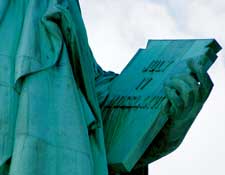For the past several months, tensions have been simmering between the Indian community and police in Edison, N.J., home to one of the highest concentrations of Indians in any township in the United States. Nearly 20 percent of Edison residents are Indian; Middlesex County, where it is located, has the distinction of having the highest proportion of Indians in any county in the country.
Tensions flared over the July 4 arrest of a 30-year-old resident Rajnikant Parikh during an illegal fireworks display. Parikh alleges he was roughed up by a police officer, who, in turn, cited him for resisting arrest, inciting a riot and assault. We will likely never know what actually transpired during that incident. However, an internal police investigation cleared the police officer. Unfortunately, the unwillingness of City Hall to undertake an impartial investigation by an external agency and the subsequent downgrading of the charges against Parikh to disorderly conduct undermines the credibility of their “internal” inquiry. For most immigrants, what is even more disturbing occurred one month later when federal agents from Immigration and Customs Enforcement (ICE) took Parikh into custody as he marched outside the municipal building with a “Racism Must End in Edison” poster at a public rally called on his behalf to protest police brutality. Although both the Edison mayor and police chief deny they had prior knowledge of Parikh’s arrest, critics charge that some police officers connived with ICE to have him arrested at the rally in an attempt to intimidate and harass him because of his public advocacy. Immigration officials have confirmed that they coordinated their efforts with local police. Any role by Edison police in orchestrating Parikh’s arrest has to be independently investigated and publicly disclosed. If police officials conspired with ICE to avenge Parikh’s criticism of them, it is a gross abuse of their power to scare not just Parikh, but any immigrant who has the temerity to exercise free speech rights in the country. The public has a right to expect that police officers will not abuse their position to persecute and terrorize them. During the past few months, there have been tense standoffs between Indian and non-Indian residents. In one particularly notorious incident, opponents taunted Indians at a public rally as “cockroaches” and “animals.” At press time, almost two months since his second arrest, Parikh remains in immigration custody pending a deportation hearing. Although married to a U.S. citizen, Parikh is reportedly in previous violation of immigration laws and possibly under an existing deportation order. However, Parikh’s immigration status is entirely irrelevant to any police abuse. Edison, like most municipalities, operates under an unwritten code barring officials from sharing information on an individual’s immigration status with federal officials. In several regions, such as New York City and San Francisco, for example, law codifies the prohibition. The Parikh incident demonstrates the need for just such a policy. Anything less invites abuse: whenever their primary case is weak or to cover up their own abuses, local officials would turn to federal immigration agents to exact vengeance against immigrant critics. Parikh’s affairs – both the charges of disorderly conduct, as well as his immigration status – should, and no doubt will, be resolved by the judicial process. But there needs to be public accountability if local and police officials in Edison abused their position to violate the civil rights of a vociferous critic to discredit and intimidate him. ICE officers also need to explain and halt their Gestapo-style storm trooper tactics of arresting Parikh at a public rally one month after the widely publicized incident, when the arrest could as easily have been affected by them weeks earlier instead of at a public forum, especially one in which serious First Amendment rights are implicated. Parikh may well prove to be out of status. But so too may ICE and Edison police officials. Parikh’s penalty is deportation from the United States. The punishment for the local and federal officials found to have abused their trust to violate his civil rights ought to be expulsion from their official positions. |
Who's Out Of Status?

